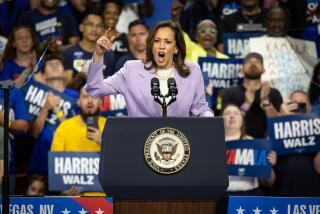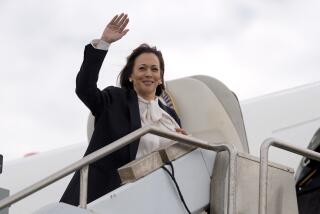Shalala Pushes for Detailed Health Care Reform Plan : Policy: Health and human services secretary says Administration must have more than a list of intentions by the time its 100-day deadline arrives.
- Share via
WASHINGTON — Health and Human Services Secretary Donna Shalala said Wednesday that the Clinton Administration must meet a self-imposed 100-day deadline with a health care reform plan that is rich in specifics, not just an outline of intentions.
“We’ve already talked about ideas--that’s what the election was about,” Shalala said in a meeting with reporters. “My hope is that we’ll have enough details to start drafting legislation. It ought to be the proposal that goes to Congress. We ought to get as much done as possible by then so it’s a go.”
The plan must address “what the system is going to look like, who will be covered and when, what will be covered, and what it will cost,” she said, adding that she considers the hardest decision facing decision-makers to be “how to pay for it.”
Some Administration analysts have projected that expanding coverage to all Americans could cost $90 billion a year or more.
“I think we’ll be able to figure out how to slow down costs and who would be covered and how,” she said. “But what the financing package is--that will be tough. But whatever the financing scheme is, it’s going to have to seem fair to the American people.”
Shalala insisted, however, that no hard decisions have been made about the components of the plan and that a steady stream of meetings and discussions has been going on with First Lady Hillary Rodham Clinton, who heads the White House Task Force on National Health Care Reform; leaders in the health and medical community and other members of the task force, which includes six Cabinet members and senior White House aides.
Shalala said the Administration is still focused on “some variation of managed competition,” but that it will not be locked into any one system that might be unworkable in some parts of the country, such as rural areas.
“You can’t get managed competition into every area of the country,” she said. “We need to have maneuverability for other areas of the country,” where there may be fewer health care providers available.
In “managed competition,” consumers are grouped into large purchasing pools that are staffed by professionals with the expertise to shop among doctors, hospitals and other providers for the best quality and price.
The Administration recognizes that consumers are especially worried about losing their freedom to choose doctors and will take that into consideration in drafting its proposals, Shalala said.
“If managed competition doesn’t give people some choice, it will be very difficult to sell,” she said.
The Administration has promised a plan that will extend universal health care coverage to all Americans and include a basic package of medical benefits. Such a benefit package could be expected to place a heavy emphasis on coverage of preventive services, such as prenatal care; childhood immunization; well-child care and mammogram screening, Shalala said.
The Administration considers such services essential “to preventing long-term health costs,” she said, adding with a laugh that such services also ultimately would contribute to “running up Social Security.”
“Everyone keeps forgetting that people will be living longer,” she said.
Americans are growing increasingly nervous about their health care coverage, she said.
“There is some insecurity out there. If you have health coverage, that’s fine. But if you lose it. . . . There are millions of Americans who don’t have coverage or who are losing their coverage. They don’t have the peace of mind that their coverage is still there.”
Above all, the plan must give Americans “peace of mind,” she said.
More to Read
Sign up for Essential California
The most important California stories and recommendations in your inbox every morning.
You may occasionally receive promotional content from the Los Angeles Times.













